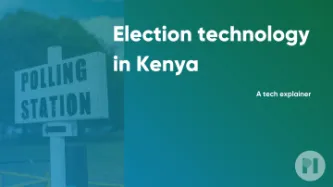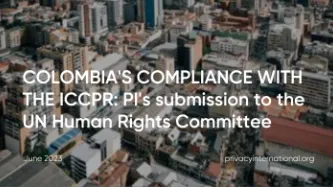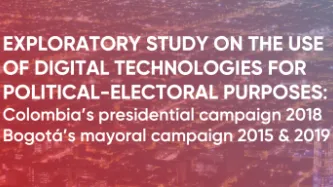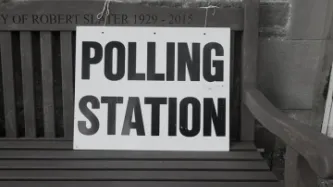Search
Content type: Advocacy
The meeting brought together representatives from UN bodies, civil society, academia, and election oversight institutions. Participants agreed that while digital technologies can improve electoral access and administration, they also pose serious threats to human rights, including privacy, freedom of expression, participation in public affairs, and equality, as well as democratic accountability if left unregulated. Discussions focused on three core areas: the role of national authorities, the…
Content type: News & Analysis
Our partner Transparencia Electoral has created an extensive and interactive index on data protection during elections in Latin America.The index evaluates laws and regulations around data protection during the election cycle in 16 countries in the region: Argentina, Bolivia, Brazil, Chile, Colombia, Costa Rica, Ecuador, El Salvador, Guatemala, Honduras, Mexico, Panama, Paraguay, Peru, the Dominican Republic and Uruguay.Organising elections is a huge government data-gathering exercise. The…
Content type: Long Read
Elections and political campaigns are increasingly mediated by digital technologies. These technologies rely on collecting, storing, and analysing personal information to operate. They have enabled the proliferation of tailor-made political advertising. The recent proliferation of AI technologies is enabling ever more sophisticated content creation and manipulation in the context of elections.In parallel, governments are continuing to invest in digital technologies for the running of elections…
Content type: News & Analysis
We’ve published a new tech explainer on election technologies in Kenya. The explainer takes a deep dive into the technologies employed to manage and administer the election process in Kenya, such as biometric voter registration (BVR), voter identification, results transmission, and candidate management systems.Electoral processes - along with elections themselves - are one of the largest government data-gathering exercises undertaken, making them susceptible to data exploitation and privacy…
Content type: Advocacy
When it comes to elections around the world, we find ourselves in a terrain that is more and more populated by digital technologies, which have an increasingly critical impact upon the realisation of democracy. Digital technologies used in the context of elections offer new opportunities to support voter participation, whilst simultaneously posing increasing challenges for voters and those who manage and oversee elections. The introduction of technologies into electoral systems in countries…
Content type: Advocacy
In the last few years, electoral processes and related activities have undergone significant changes, driven by the development of digital technologies.The use of personal data has redefined political campaigning and enabled the proliferation of political advertising tailor-made for audiences sharing specific characteristics or personalised to the individual. These new practices, combined with the platforms that enable them, create an environment that facilitate the manipulation of opinion and…
Content type: Advocacy
In June 2023, we made a submission to the Human Rights Committee ahead of its 138th Session in relation to Colombia’s compliance with the International Covenant on Civil and Political Rights (ICCPR).
We called on the UN Human Rights Committee to make the following recommendations to Colombia:
The Electoral Law should ensure that the electoral register does not include personal data other than what is required to establish eligibility to vote. The law should define the minimum…
Content type: Long Read
The final report on the 2022 Kenyan election is the result of a collaboration with the Carter Center as part of a joint pre-election assessment focussing on the use of technology in the run up to and during the Kenyan election which took place 9 August. The final report, published this month, follows our preliminary statement of September 2022.
Below we set out a few key observations in connection with the use of data and technology, as well as some of the key data protection incidents.
Key…
Content type: News & Analysis
Privacy International collaborated with the Carter Center as part of a pre-election assessment team focussing on the use of technology in the run up to and during the Kenyan election which took place 9 August.
In the context of this pre-election assessment, PI travelled to Nairobi between 4th-10th July 2022 in order take a deeper look at issues connected to voting technologies being used in the Kenyan elections with a particular focus on the implementation of the Data Protection Act.
PI first…
Content type: Advocacy
The role that personal data plays in political campaigns https://privacyinternational.org/learn/data-and-elections and the risks of data abuse and exploitation only entered into the public discourse a few years ago, when Cambridge Analytica became a household name thanks to several scandals over the course of 2017 and 2018.
Since then, we have seen a flurry of initiatives that have helped shed light on the otherwise very opaque practices of digital campaigning. There have been public…
Content type: Report
Democratic engagement is increasingly mediated by digital technology, from campaigning to election results transmission. A key example of the application of new technologies to democratic processes is the growing practice of micro-targeting in political campaigning around the globe, including Colombia.
In 2018, the mayor of Bogotá, Enrique Peñalosa, was accused of hiring Cambridge Analytica during his 2015 election campaign. That same year, Cambridge Analytica’s former director acknowledged…
Content type: News & Analysis
Legislation to "strengthen the integrity of UK elections and protect our democracy" through the Elections Integrity Bill was introduced to parliament this week.
This legislation will require people, for the first time in Great Britain, to show a state-issued photo ID, such as a driving license or passport, in order to exercise their right to vote, perhaps by the 2023 General Elections. The changes would affect elections in England, Scotland and Wales while voters in Northern Ireland are already…
Content type: News & Analysis
The report on disinformation by the UN Special Rapporteur on the promotion and protection of the right to freedom of opinion and expression follows a growing trend by international bodies (including the Organization of American States and the European Commission) to assess and regulate the global phenomenon that is disinformation.
The report strongly links the spread of disinformation with the gratuitous data collection and profiling techniques utilised by the online…
Content type: Advocacy
This report is presented by TEDIC (Technology and Community Association) and Privacy International (PI). TEDIC is a non-governmental, non-profit organization, based in Asunción, that promotes and defends human rights on the Internet and extends its networking to Latin America. PI is a London based human rights organization that works globally at the intersection of modern technologies and rights.
TEDIC and PI wish to express some concerns about the protection and promotion of the right to…
Content type: News & Analysis
Uganda's Presidential election in January 2021 resulted in the incumbent President Museveni winning his sixth term in office, having held power for 35 years. The election took place amidst a global pandemic and the run up to election day was fraught. Violence left dozens dead and hundreds more arrested, including the opposition candidate Bobi Wine. Mass rallies and in person campaign meetings were banned due to Covid restrictions and political parties in Uganda were encouraged to conduct “…
Content type: Advocacy
Esta carta también está disponible en inglés.
Estimados Sres. Zuckerberg y Pichai,
En los últimos años, ustedes han sido pioneros en la creación de importantes herramientas de transparencia para ayudar a los usuarios de su plataforma a entender, conocer y contextualizar la propaganda electoral a las cuales se ven expuestos. Estamos de acuerdo en que los procesos de verificación de anunciantes y los repositorios de anuncios son salvaguardas claves contra la manipulación y la desinformación en…
Content type: Advocacy
This letter is also available in Spanish.
Dear Mr. Zuckerberg and Mr. Pichai,
In the past few years, you have pioneered important transparency tools to help your platform users understand, learn about and contextualise the political advertising they see. We agree that advertiser verification processes and ad repositories are key safeguards against online manipulation and misinformation. However, we are saddened to observe that these benefits have not been equally distributed among your global…
Content type: Video
In recent years, the use of online political campaigning has gained significant traction, with regulatory bodies often struggling to catch up. The unregulated use of political ads can pose threats to transparency, and all the more so when online platforms fail to play their part.
We at PI, together with ELSAM, are investigating the reach, effectiveness and impact of regulation by social media platforms and electoral authorities on online political advertising. Our research has shown…
Content type: Video
Nos últimos anos, o uso de campanhas políticas online ganhou força significativa, com os órgãos reguladores muitas vezes lutando para se atualizar. O uso não regulamentado da propaganda política pode representar ameaças à transparência, ainda mais quando as plataformas online deixam de cumprir a sua parte.
A PI, juntamente com o InternetLab, está investigando o alcance, a eficácia e o impacto da regulamentação por plataformas de mídia social e autoridades eleitorais na…
Content type: Examples
Article extract:
"An app that the UK’s governing party launched last year — for Conservative Party activists to gamify, ‘socialize’ and co-ordinate their campaigning activity — has been quietly pulled from app stores..."
"...We know the name of the Conservative Campaigner app’s supplier because this summer we raised privacy concerns about the app — on account of its use of uCampaign’s boilerplate privacy policy, if you clicked to read the app’s privacy policy earlier this year.
The wording…
Content type: Examples
Article extract:
"A meaty first report by the UK parliamentary committee that’s been running an inquiry into online disinformation since fall 2017, including scrutinizing how people’s personal information was harvested from social media services like Facebook and used for voter profiling and the targeting of campaign ads — and whose chair, Damian Collins — is a member of the UK’s governing Conservative Party, contains one curious omission.
Among the many issues the report raises are privacy…
Content type: Examples
Article extract:
""People with center-right views feel like the big social platforms, Facebook and Twitter, are not sympathetic to their views,” said Thomas Peters, the chief executive of uCampaign, a start-up in Washington that developed the N.R.A., Great America and Trump campaign apps. “It’s creating a safe space for people who share a viewpoint, who feel like the open social networks are not fun places for them.”
Sheltered from the broader public, however, the platforms can intensify…
Content type: Examples
Article extract:
"Ireland's two largest anti-abortion campaigns are facing questions over privacy after a BuzzFeed News analysis found that personal user data gathered by both of their apps can be shared with an international network of conservative and religious groups that includes the US National Rifle Association.
The Save the 8th campaign and the LoveBoth Project are at the forefront of the campaign to prevent the repeal of the Eighth Amendment of Ireland's constitution – which makes…
Content type: Examples
Article extract:
"French laws designed to prohibit individual-level targeting are circumvented by services like those provided by Paris-based firm Liegey Muller Pons, which aggregates personal data. Such services are no less data-intensive than those unconstrained by such legal requirements."
"• Liegey Muller Pons (LMP) is a digital campaigning firm that has provided services to over 1,000 campaigns across six European countries. French law prohibits individual-level targeting except under…
Content type: Examples
Article extract:
"On Aug. 2, the Liberal party sent an email to Liberal campaigns across the country, promoting services offered by Data Sciences Inc., a company owned by Tom Pitfield, an old friend of Justin Trudeau and the 2019 campaign’s digital director.
The party urged local campaigns to hire the company to handle their Facebook ad buys, for $5,000, $8,000 or $12,000, a significant chunk of the budget of local campaigns, which are limited by the Elections Act to about $100,000.
“The…
Content type: Examples
Article extract:
"Anti-smoking campaigners have expressed alarm that "big tobacco" has been employing two of the world's most powerful lobbying companies in a bid to stymie the introduction of plain packaging for cigarettes.
Crosby Textor, which has been hired by the Conservative party to provide "strategic direction" at the next election, has played a powerful behind-the-scenes role in mobilising opposition to the Australian government's plans for plain packaging, which became law on…
Content type: Examples
Article extract:
"The lobbying firm founded by election guru Lynton Crosby is reported to have advised private healthcare providers on how to exploit failings in the NHS..."
"...Crosby Textor advised an umbrella group of private healthcare providers on how to exploit perceived “failings”, according to a leaked document obtained by the Guardian.
The newspaper published extracts from a slideshow presentation produced for the H5 Private Healthcare Alliance, which stated that people believe the…
Content type: Examples
Article extract:
"The lobbying firm run by Boris Johnson’s close ally Sir Lynton Crosby has secretly built a network of unbranded “news” pages on Facebook for dozens of clients ranging from the Saudi government to major polluters, a Guardian investigation has found.
In the most complete account yet of CTF Partners’ outlook and strategy, current and former employees of the campaign consultancy have painted a picture of a business that appears to have professionalised online disinformation,…
Content type: Examples
Article extract:
"At the end of an alley on a nondescript street, a political consulting firm with the unusual name of Aristotle International has compiled the nation's largest voter databank, the names of 150 million Americans registered to vote. And it is selling them to politicians like George W. Bush, Joseph I. Lieberman and John McCain in ways that many fear removes too much privacy from the voting booth..."
"...Of particular concern this election season, when electronic privacy has…
Content type: Examples
Article extract:
"One of the nation's largest commercial distributors of voter data sold voter-registration lists featuring detailed personal information without verifying the identity or intent of buyers.
Aristotle International used a website to sell the lists, which contain details about registered voters from nearly every state. The data includes birth dates, home addresses, phone numbers, race, income levels, ethnic backgrounds and, in some cases, religious affiliations.
Although voter-…














